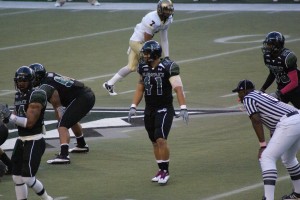My cousin’s son Corey is hoping to make the final cut later this month and become a Minnesota Vikings moving from amateur status to professional football player. Corey is chasing his dream and following his progress over the past four years has given me a glimpse of the differences that distinguish amateurs and professionals and the shift in thinking that comes with it.
Recently, one of my mentors described 14 of these differences separating amateurs and professionals. Although each profession has a different set of skills that make one a “professional” there are 5 differences that stand out to me that will make you a “pro” not by your title or designation but by the way you perform.
An amateur will focus on speaking – A professional will focus on listening.
- Have you ever had someone tell you all about what they have to offer you and not once ask what it is that you need? I have had this experience numerous times and more than once, my thought was “what an amateur.” If you really want to come across as a professional in your field, focus on the client or customer and LISTEN to what it is that they need and then communicate how you can help them achieve it.
An amateur can lack focus – A professional provides clear expectations with a specified outcome.
- As a professional, be very specific on what is it that you have to offer and how it will solve a problem or improve something already in place. Be able to paint a picture of what that successful outcome will look like.
An amateur will TELL you what you need – A professional will ASK what it is that you need.
- As a professional, ask questions about the needs of your client or customer. Not only does this build a relationship on a higher level and allow for better engagement, it will provide insight on what is actually needed to solve a problem.
An amateur will end with the sell – A professional will ask “How would you like to move foward?”
- A professional will lay the groundwork necessary that will motivate and encourage the client or customer to move forward with the transaction. This “buy-in” is the end result of providing a clear, concise and relevant description of the product or service and why it will add value to the one receiving it.
An amateur will focus on the transaction – A professional will focus on the relationship.
- This is probably the most important aspect of coming across as a professional. We have all heard the expression “It’s not what you know, but who you know” that will inevitably provide success. News Flash … if you don’t build the relationship, the person you are trying to business with is not going to work with you whether they need what you are offering or not. People do business with people that they connect with.
Our culture suggests that if you put in the time and earn the paper to hang on your wall, you are a “trained professional.” The relationships that we build and the genuine desire to add value to others is what will make us a “recognized professional.”
If you want to be a professional, then ACT LIKE ONE! Focus more on the other person and less on yourself.
**********************************************************************************************************
Don’t miss a single post from Building What Matters by subscribing at the top left of this page.
Barry Smith www.buildingwhatmatters.com 8/6/12 photo by author


